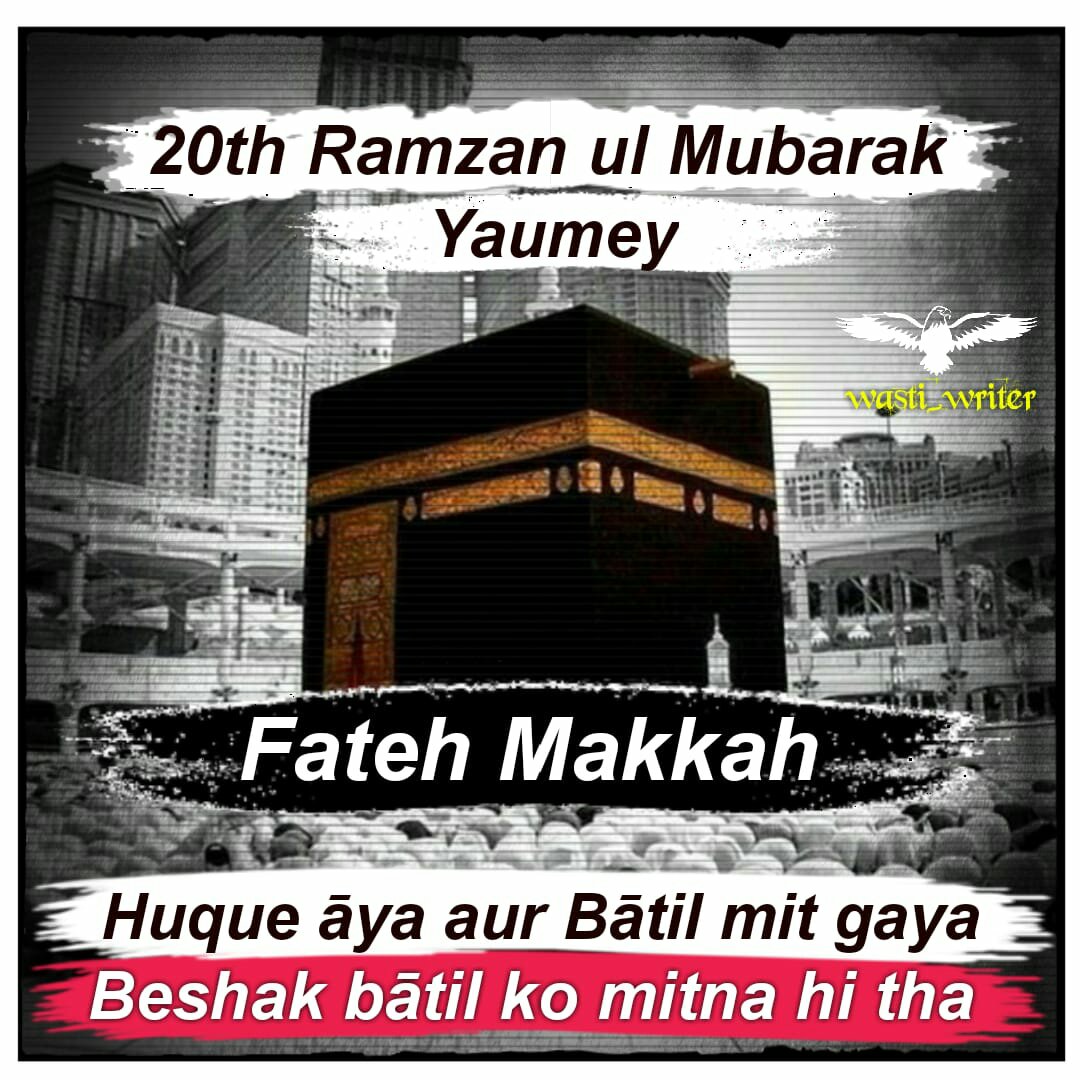The second great Islamic event that took place in Ramadan was Fatah Makkah (the conquest of Makkah) on Ramadan 20, 8 AH (630 AD) when Muslims victoriously entered the city after being forced into exile for eight years and after 21 years of long struggle.
This event marked the ultimate victory of the Islamic forces in Arabia and marked the beginning of a new era in the history of mankind.
The conquest of Makkah takes one even further back in time. Prophet Ibrahim (peace be upon him) and his son Ismael had purified and raised the foundation of Bait-Allah, the House of Allah, the Ka’bah in Makkah, for the sole worship of Allah. Later the people degenerated into shirk (polytheism), associating partners with Allah.
The Arabs started believing in hundreds of gods and goddesses, and kept stone idols in the Ka’bah.
On the eve of the conquest, Abu Sufyan adopted Islam. When asked by Prophetﷺ, he conceded that the Meccan gods had proved powerless and that there was indeed “no god but Allah”, the first part of the Islamic Prophet’s confession of faith. In turn, Prophetﷺ declared Abu Sufyan’s house a sanctuary because he was the present chief, and that all the others were gathered over his territory, therefore:
“Even he Who enters the house of Abu Sufyan will be safe, He who lays down arms will be safe, He who locks his door will be safe”.
He also declared:
“Allah has made Mecca a sanctuary since the day He created the Heavens and the Earth, and it will remain a sanctuary by virtue of the sanctity Allah has bestowed on it until the Day of Resurrection. It (fighting in it) was not made lawful to anyone before me. Nor will it be made lawful to anyone after me, and it was not made lawful for me except for a short period of time. Its animals (that can be hunted) should not be chased, nor should its trees be cut, nor its vegetation or grass uprooted, nor its Luqata (most things) picked up except by one who makes a public announcement about it.”
Then, along with his companions Prophetﷺ visited the Ka’bah and the idols were broken.
Thereupon Prophetﷺ recited the following verse from the Quran:
“Say, the Truth has come and falsehood gone. Verily falsehood is bound to vanish.”(Qur’an, 17:81)
The people assembled at the Kaaba, and Prophetﷺ delivered the following address:
“There is no God but Allah. He has no associate. He has made good His promise that He held to his bondman and helped him and defeated all the confederates. Bear in mind that every claim of privilege, whether that of blood or property is abolished except that of the custody of the Ka’bah and of supplying water to the pilgrims. Bear in mind that for any one who is slain the blood money is a hundred camels. People of Quraish, surely God has abolished from you all pride of the time of ignorance and all pride in your ancestry, because all men are descended from Adam (عليه السلام), and Adam (عليه السلام) was made of clay.”
Then Prophetﷺ turning to the people said:
“O Quraish, what do you think of the treatment that I should accord you?”
And they said, “Mercy, O Prophet of Allah. We expect nothing but good from you.”Thereupon Prophet Muhammadﷺ declared:
“I speak to you in the same words as Yusuf (peace be upon him) spoke to his brothers. This day there is no reproof against you; Go your way, for you are free.”
Prophet’sﷺ prestige grew after the surrender of the Meccans. Emissaries from all over Arabia came to Medina to accept him.
Ten people were ordered to be killed: Ikrimah ibn Abi-Jahl, Abdullah ibn Saad ibn Abi Sarh, Habbar bin Aswad, Miqyas Subabah Laythi, Huwairath bin Nuqayd, Abdullah Hilal and four women who had been guilty of murder or criticising Prophetﷺ or had sparked off the war and disrupted the peace.
However, they were not all killed; Ikrimah lived to adopt Islam and fight in future battles among Muslim ranks. Of the two singing girls who were outlawed by Prophetﷺ, one was slain but the other spared because she converted to Islam. Ibn Abi Sarh had been granted protection under Uthman ibn Affan (May Allah be and pleased with him) and when he initially refused to take the mandatory oath of allegiance to Prophetﷺ, the bystanders still did not kill him, much to the regret of Prophetﷺ.
Ramadan is therefore more than just the month of fasting or personal piety. The month recalls the past, taking one to the very foundations of Islam, and prods one to mull over the significance of historic events and take heed from them, to restore the morals of Islam and as an human which were introduced by Allah the Exalted through the means of the Prophet of Mercyﷺ.





